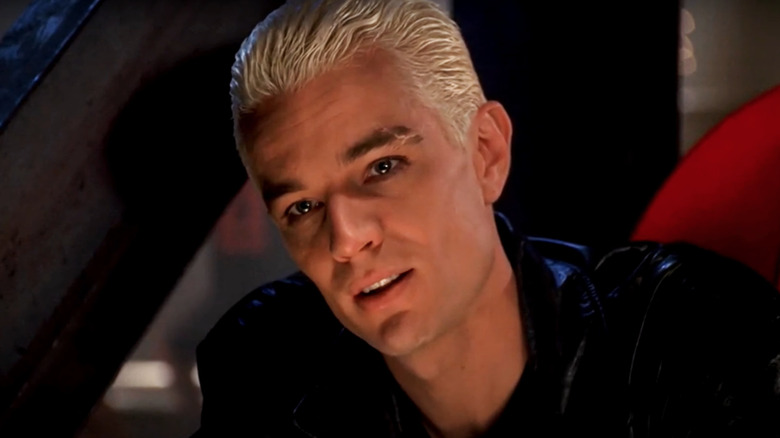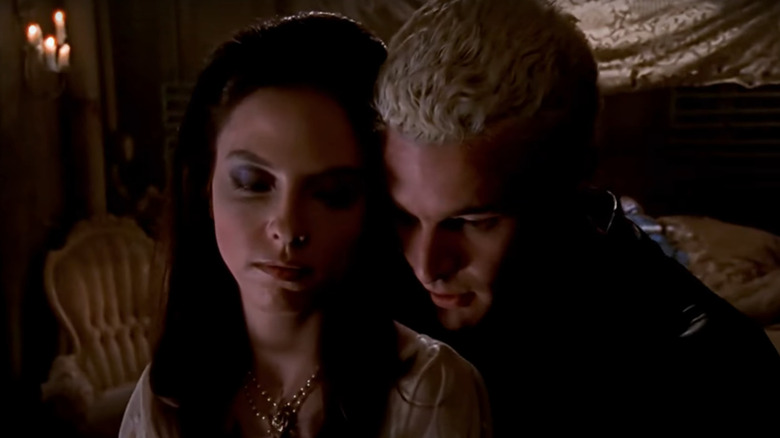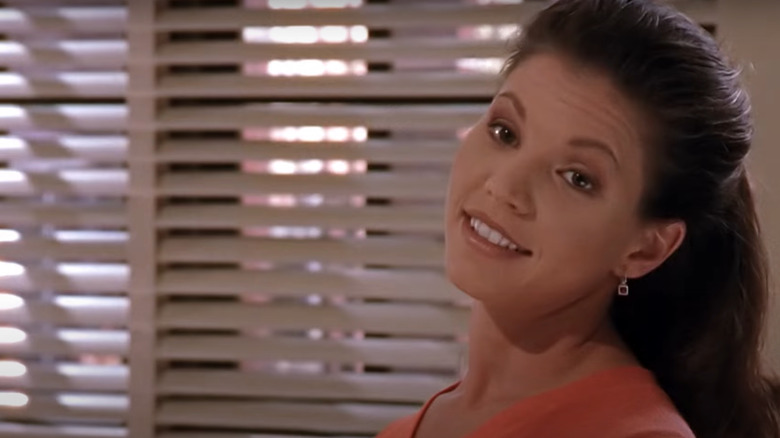Slayers: A Buffyverse Story Almost Had A Very Different Name
"Buffy the Vampire Slayer" might have left TV screens 20 years ago, but the exploits of the slayer and her compatriots didn't end in 2003. Take for instance how many of the events from the much-derided "Buffy the Vampire Slayer" movie were re-written back into Buffy lore, so to speak, in a 1999 comic book series by Dan Brereton and Christopher Golden entitled "The Origin." Co-signed by "Buffy" creator and showrunner Joss Whedon, "The Origin" basically retold the 1992 film in a way that fit Whedon's original vision and the show's tone. And that's just one of many Buffy tales that have been told (or retold, in this instance) outside of the show proper.
Now, Golden has teamed up with actress Amber Benson, who played Tara in "Buffy," for the new Audible original, "Slayers: A Buffyverse Story." This audio series further expands the Buffyverse by telling a story set 10 years after the events of the original series finale. "Slayers" introduces a multiversal concept to proceedings, allowing for such surprises as a slayer version of Cordelia (Charisma Carpenter) who shows up in the main timeline looking for fan-favorite vamp Spike (James Marsters).
Alongside these returning stars, the series features the voice talents of original cast members such as Anthony Head, Emma Caulfield, and of course, Benson herself. Unfortunately, Sarah Michelle Gellar doesn't appear, which means "Slayers" returns to the Buffyverse without Buffy. But that doesn't mean the story of "Slayers" isn't one worth telling. In fact, there's a meta element to the series which focuses on overcoming past traumas. In light of allegations that Whedon ran a toxic set on the original "Buffy" series, that seems like a pretty important narrative to play out. It's also why the new series' original title had to be rethought.
Keeping Slayers true to Buffy
Spike was one of the most popular characters on "Buffy," with actor James Marsters delivering such a charismatic performance that he secured his standing as a series regular beyond his season 2 debut. Now, Spike is on hand to lead us through this latest expedition into Buffy-land, narrating "Slayers" and acting as a guide for a new slayer in the form of Indira (Laya DeLeon Hayes).
Marsters and the cast of the series spoke to Variety about Spike being so central to "Slayers," where they revealed that, early on, he was supposed to have an even more important role. Asked about how "Buffy" has always been focused on "female empowerment," Marsters said he recognized the importance of that element during development and revealed that he came up with the name "Slayers" which replaced the original title, "Spike and Dru" — referring to the British vamp and his longtime girlfriend Drusilla (Juliet Landau). Marsters added:
"Spike is a great character, but he doesn't encapsulate the theme. I'm in the project a lot, but what are you going to call it, "Spike, the Vampire, Slayer of Vampires?" It's not the same thing. It is much more exciting to keep it focused, as it always has been, on a woman who is overcoming the challenges of life, and using a vampire demon metaphor to talk about those challenges."
Marsters went on to highlight that he sees the focus on female empowerment as "one of the big strengths of the project." And while the series might not always succeed at capturing what made "Buffy" great, it is at least in line with the show's original concept of turning the stereotypical "helpless blonde" into the hero.
Transcending fiction
Loving "Buffy" has become complicated since the revelations about Joss Whedon have come to light. But "Slayers" clearly seems focused on trying to address the issue with its narrative that, as /Film's Valerie Ettenhofer wrote in her review, "is working through something that goes beyond the boundaries of fiction." Of course, that's true of the original show too, which despite the stain Whedon's behavior has left on its legacy, often dealt with very serious, real-world experiences that undoubtedly went beyond the boundaries of fiction. Not only was the show itself — simply by virtue of its premise — about female empowerment, it explored in unflinching detail such themes as grief and loss with the season 5 episode "The Body," and social isolation with the season 1 episode "Out of Mind, Out of Sight." These are just two of many examples of how "Buffy" has always transcended fiction.
In that sense, calling the new series "Spike and Dru" could have easily looked as though the Audible Original was designed to leverage the popularity of a fan-favorite character, when in fact the show serves a very important function in the history of "Buffy" and the legacy of the show. Thankfully, James Marsters recognized that very point early on. What's more, as Variety notes, Amber Benson wanted to focus on "the characters she felt weren't serviced enough in the original show," and was intent on highlighting "what it means to be a slayer who is also a woman of color." That only further emphasizes the importance of renaming the series, as Spike — popular though he was — was hardly an underserved character.


